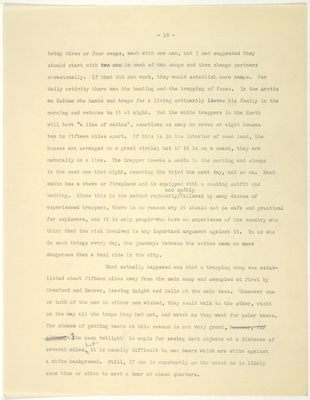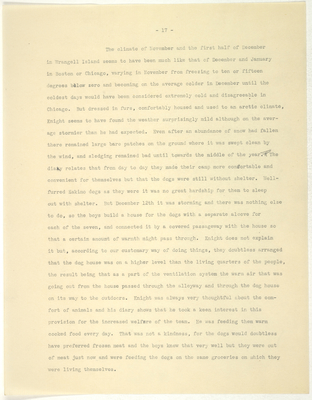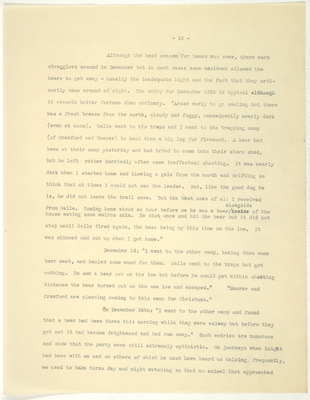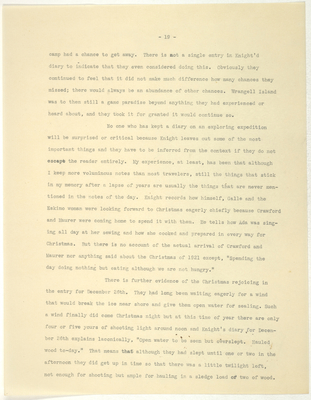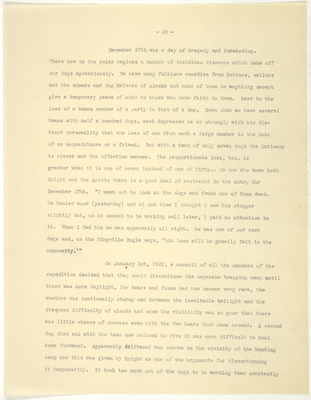Pages
stefansson-wrangel-09-25-006-016
- 16 -
being three or four camps, each with one man, but I had suggested they should start with two men in each of two camps and then change partners occasionally. If that did not work, they would establish more camps. For daily activity there was the hunting and the trapping of foxes. In the Arctic an Eskimo who hunts and traps for a living ordinarily leaves his family in the morning and returns to it at night. But the white trappers in the North will have "a line of cabins", sometimes as many as seven or eight houses ten to fifteen miles apart. If this is in the interior of some land, the houses are arranged in a great circle; but if it is on a coast, they are naturally in a line. The trapper leaves a cabin in the morning and sleeps in the next one that night, reaching the third the next day, and so on. Each cabin has a stove or fireplace and is equipped with a cooking outfit and bedding. Since this is the method regularly/and safely followed by many dozens of experienced trappers, there is no reason why it should not be safe and practical for explorers, and it is only people who have no experience of the country who think that the risk involved is any important argument against it. To us who do such things every day, the journeys between the cabins seem no more dangerous than a taxi ride in the city.
What actually happened was that a trapping camp was established about fifteen miles away from the main camp and occupied at first by Crawford and Maurer, leaving Knight and Galle at the main base. Whenever one or both of the men in either men wished, they could walk to the other, visit on the way all the traps they had set, and watch as they went for polar bears. The chance of getting bears at this season is not very great, however, for although The noon twilight is ample for seeing dark objects at a distance of several miles,but it is usually difficult to see bears which are white against a white background. Still, if one is constantly 0n the watch he is likely some time or other to meet a bear at close quarters.
stefansson-wrangel-09-25-006-017
- 17 -
The climate of November and the first half of December in Wrangell Island seems to have been much like that of December and January in Boston or Chicago, varying in November from freezing to ten or fifteen degrees below zero and becoming on the avgerage colder in December until the coldest days would have been considered extremely cold and disagreeable in Chicago. But dressed in furs, confortably housed and used to an arctic climate, Knight seems to have found the weather surprisingly mild although on the average stormier than he had expected. Even after an abundance of snow had fallen there remained large bare patches on the ground where it was swept clean by the wind, and sledging remained bad until towards the middle of the year. The diary relates that from day to day they made their camp more comfortable and convenient for themselves but that the dogs were still without shelter. Wellfurred Eskimo dogs as they were it was no great hardship for them to sleep out with shelter. But December 12th it was storming and there was nothing else to do, so the boys built a house for the dogs with a separate alcove for each of the seven, and connected it by a covered passageway with the house so that a certain amount of warmth might pass through. Knight does not explain it but, according to our customary way of doing things, they doubtless arranged that the dog house was on a higher level than the living quarters of the people, the result being that as a part of the ventilation system the warm air that was going out from the house passed through the alleyway and through the dog house on its way to the outdoors. Knight was always very thoughtful about the comfort of animals and his diary shows that he took a keen interest in this provision for the increased welfare of the team. He was feeding them warm cooked food every day. That was not a kindness, for the dogs would doubtless have preferred frozen meat and the boys knew that very well but they were out of meat just now and were feeding the dogs on the same groceries on which they were living themselves.
stefansson-wrangel-09-25-006-018
- 18 -
Although the best season, for bears was over, there were stragglers around in December but in most cases some adcident allowed the bears to get away - usually the inadequate light and the fact that they ordinarily came around at night. The entry for is typical although it records better fortune than ordinary. "Arose early to go sealing but there was a fresh breeze from the north, cloudy and foggy, consequently nearly dark (even at noon). Galle went to his traps and I went to the trapping camp (of Crawford and Maurer) to haul them a big log for firewood. A bear had been at their camp yesterday and had tried to come into their storm shed, but he left rather hurriedly after some ineffectual shooting. It was nearly dark when I started home and blowing a gale from the north and drifting so thick that at times I could not see the leader. But, like the good dog he is, he did not leave the trail once. But the best news of all I received from Galle. Coming home about an hour before me he was a bear/alongsidexxxxxx of the house eating some walrus skin. He shot once and hit the bear but it did not stop until Galle fired again, the bear being by this time on the ice. It was skinned and cut up when I got home."
: "I went to the other camp, taking them some bear meat, and hauled some wood for them. Galle went to the traps but got nothing. He saw a bear out on the ice but before he could get within shooting distance the bear turned out on the sea ice and escaped." "Maurer and Crawford are planning coming to this camp for Christmas."
On : "I went to the other camp and found that a bear had been there this morning while they were asleep but before they got out it had become frightened and had run away." Such entries are numerous and show that the party were still extremely optimistic. On journeys when Knight had been with me and on others of which he must have heard us talking, frequently, we used to take turns day and night watching so that no animal that approached
stefansson-wrangel-09-25-006-019
- 19 -
camp had a chance to get away. There is not a single entry in Knight'd diary to indicate that they even considered doing this. Obviously they continued to feel that it did not make much difference how many chances they missed; there would always be an abundance of other chances. Wrangell Island was to them still a game paradise beyond anything they had experienced or heard about, and they took it for granted it would continue so.
No one who has kept a diary on an exploring expedition will be surprised or critical because Knight leaves out some of the most important things and they have to be inferred from the context if they do not escape the reader entirely. My experience, at leat, has been that although I keep more voluminous notes than most travelers, still the things that stick in my memory after a lapse of years are usually the things that are never mentioned in the notes if the day. Knight records how himself, Galle and the Eskimo woman were looking forward to Christmas eagerly chiefly because Crawford and Maurer were coming home to spend it with them. He tells how Ada was singing all day at her sewing and how she cooked and prepared in every way for Christmas. But there is no account of the actual arrival of Crawford and Maurer nor anything said about the Christmas of 1921 except, "Spending the day doing nothing but eating although we are not hungry."
There is further evidence of the Christmas rejoicing in the entry for December 26th. They had long been waiting eagerly for a wind that would break the ice near shore and give them open water for sealing. Such a wind finally did come Christmas night but at this time of year there are only four or five yours of shooting light around noon and Knight's diary for December 26th explains laconically, "Open water to be seen but overslept. Hauled wood to-day." That means that although they had slept until one or two in the afternoon they did get up in time so that there was a little twilight left, not enough for shooting but ample for hauling in a sledge load or two of wood.
stefansson-wrangel-09-25-006-020
- 20 -
December 27th was a day of tragedy and foreboding. There are in the polar regions a number of insidious diseases which take off our dogs mysteriously. We have many folklore remedies from Eskimos, sailors and the miners and dog drivers of Alaska but none of them do anything except give a temporary peace of mind to those who have faith in them. Next to the loss of a human member of a party is that of a dog. Even when we have several teams with half a hundred dogs, each impresses us so strongly with his distinct personality that the loss of one from such a large number is the loss of an acquaintance or a friend. But with a team of only seven dogs the intimacy is closer and the affection warmer. The proportionate loss, too, is greater when it is one of seven instead of one of fifty. To one who knew both Knight and the Arctic there is a good deal of restraint in the entry for December 27th. "I went out to look at the dogs and found one of them dead. We hauled wood (yesterday) and at one time I thought I saw him stagger slightly but, as he seemed to be working well later, I paid no attention to it. When I fed him he was apparently all right. He was one of our best dogs and, as the Bingville Bugle says, 'his loss will be greatly felt in the community.'"
On , a council of all the members of the expedition decided that they would discontinue the separate trapping camp until there was more daylight, for bears and foxes had now become very rare, the weather was continually stormy and between the inevitable twilight and the frequent difficulty of clouds and snow the visibility was so poor that there was little chance of success even with the few bears that came around. A second dog died and with the team now reduced to five it was more difficult to haul home firewood. Apparently driftwood was scarce in the vicinity of the hunting camp and this was given by Knight as one of the arguments for discontinuing it temporarily. It took too much out of the dogs to be working them constantly
